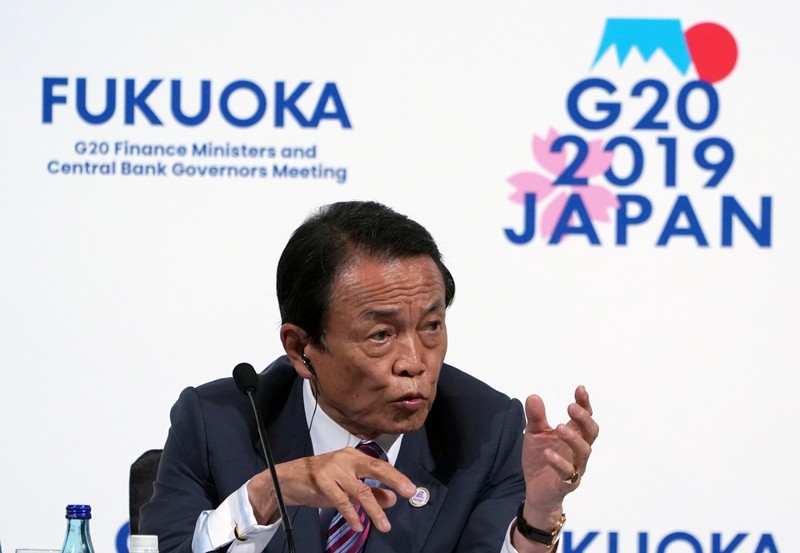
FILE PHOTO: Japan’s Finance Minister Taro Aso answers a question during a news conference of the G20 finance ministers and central bank governors meeting in Fukuoka, Japan June 9, 2019. Eugene Hoshiko/Pool via REUTERS/File Photo
October 4, 2019
By Tetsushi Kajimoto
TOKYO (Reuters) – Japan’s finance minister on Friday dismissed the need to boost fiscal stimulus to counter the impact of a national sales tax hike, despite expectations the government and the Bank of Japan may act to reduce pressure on the world’s third largest economy.
The government rolled out a twice-delayed rise in the sales tax to 10% from 8% on Tuesday, a move that is seen as critical for fixing the country’s tattered finances. But there are fears the higher tax could hurt consumer spending and tip the economy into recession.
This has led to speculation that Tokyo will step up fiscal spending although it has already taken measures to mitigate the pain on consumption, mindful of the severe economic downturn that followed the last increase in the sales tax in 2014.
Speaking to reporters after a cabinet meeting, however, finance minister Taro Aso said he saw no big confusion among retailers and shoppers over the tax hike as corporate earnings and household incomes were solid.
While U.S.-China trade frictions warranted attention, “we are not facing such a situation that stimulus should be taken immediately,” Aso said.
Market expectations of further BOJ easing also grew after Governor Haruhiko Kuroda pledged in July to act preemptively. Signs have also emerged recently that its nine-member board may be tilting toward further easing as global pressures intensify.
“We expect the Bank of Japan to maintain its ultra-loose monetary policy settings, and we would not rule out further easing measures if growth falters below their expectations,” Fitch Ratings said in a statement issued on Friday.
“We would also not rule out additional fiscal stimulus, possibly from a supplementary budget early next year, to counter cyclical headwinds.”
Earlier on Friday, Economy Minister Yasutoshi Nishimura told reporters it was necessary to carefully watch consumption trends as there are worries the hike may weigh on consumer sentiment.
Fitch affirmed Japan’s ‘A’/Stable rating in July, taking the tax hike and the offsetting measures into account. The tax hike will help reduce Japan’s gross general government debt-to-GDP ratio to just over 220% by 2028, from 232% at present – still the highest among Fitch-rated sovereigns.
The ratings agency expects Japan’s GDP growth to slow after a strong first half of this year, as external demand weakens due to slowing global growth and the U.S.-China trade war.
Growth momentum likely faltered in the July-September quarter, as highlighted by weakening consumer confidence and slowing purchases of durable goods, it said, adding that it estimates full-year 2019 growth at 0.8%, slowing to 0.3% next year.
(Reporting by Tetsushi Kajimoto; Additional reporting by Daniel Leussink; Editing by Kim Coghill & Shri Navaratnam)

